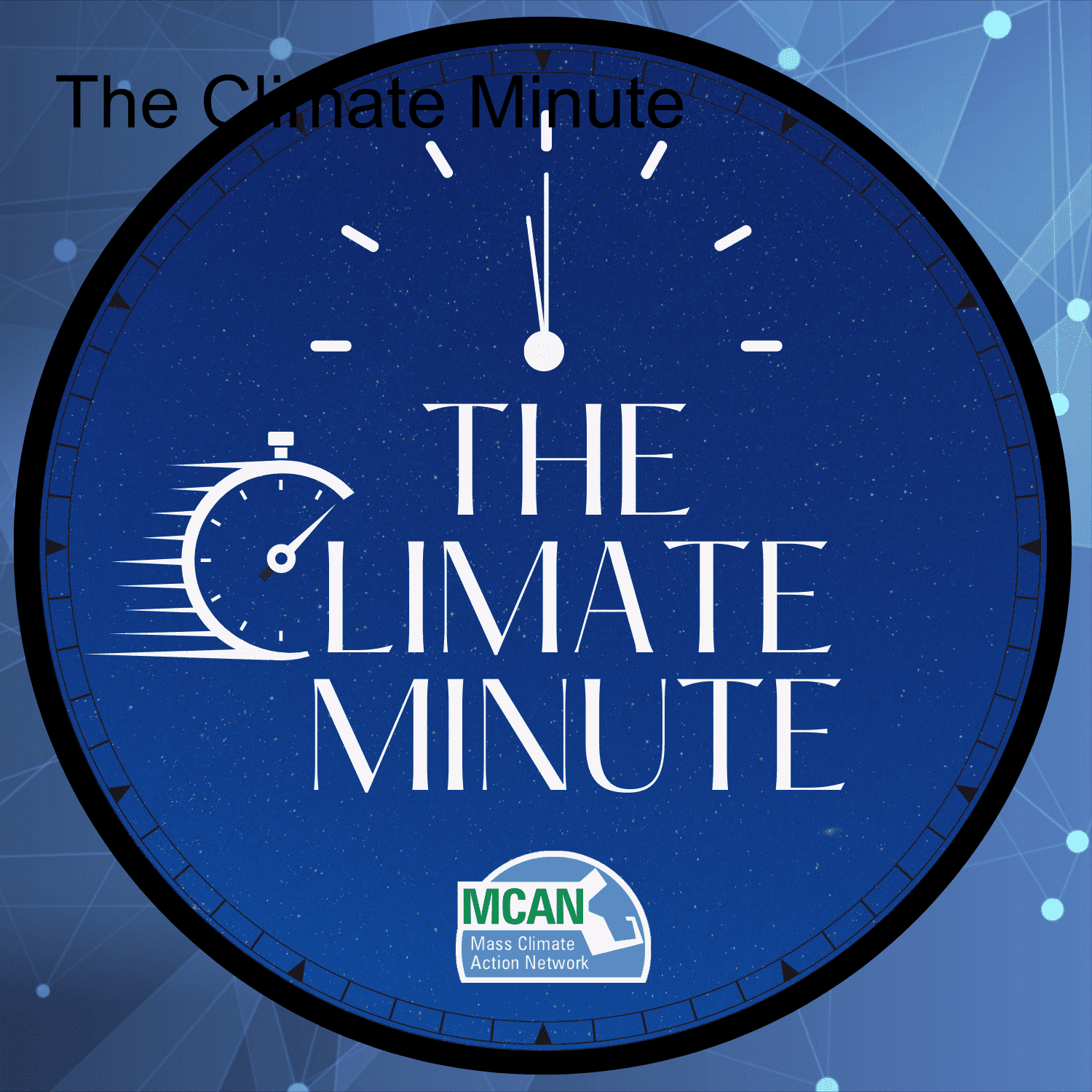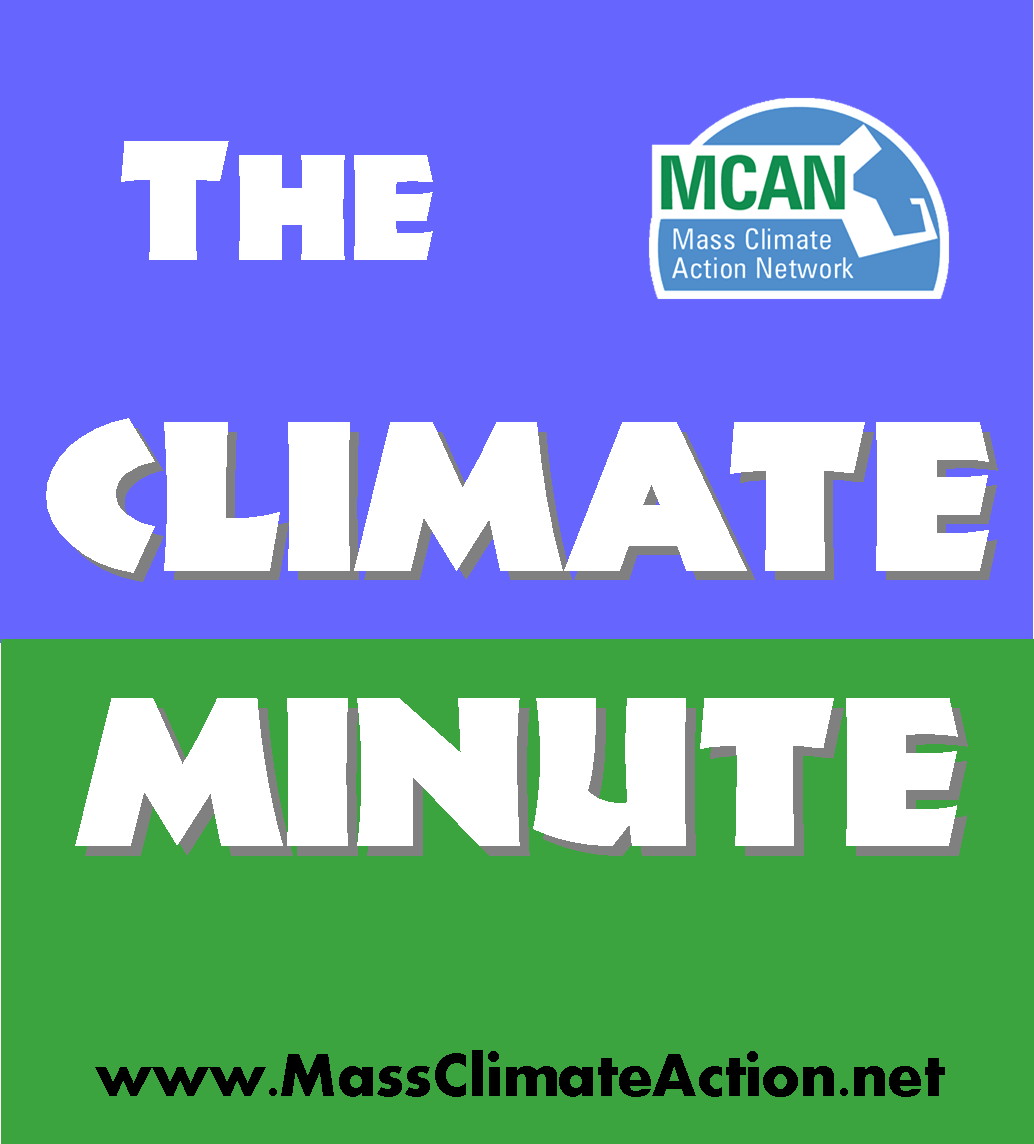
765.7K
Downloads
995
Episodes
The Climate Minute examines current news on global warming, climate change, renewable energy and the prospects for progress on international negotiations, carbon taxes and clean energy policy.
Episodes

Friday Feb 22, 2013
The MCAN Climate Minute - Protests and protestations.
Friday Feb 22, 2013
Friday Feb 22, 2013
Well, the Keystone protest in Washington is over and Rob and Ted are back at the pink and orange coffeehouse to compare notes about the march and try to figure out what's next.
 The protest created an interesting back-and-forth between several observers as to the most effective path forward for the climate movement, and we give our two cents.
Also, some breaking news coming out of DC (well, breaking rumor) about the next EPA director has Massachusetts environmentalists a-flutter.
As always, click on the “MCAN Climate Minute” picture to the right to start the recording in a new window.
Here are some links to go along with our talk this morning.
We've cobbled together some clips from the speeches and march. Forgive the amateur video, but, hey, we're amateurs at this...
[youtube http://www.youtube.com/watch?v=PJ_tp7RKJnY]
The march caused a some folks to question the approaches required to fight climate change. Apparently, Andy Revkin of the NY Times Dot.Earth blog was engaging in a little twitter back and forth during the march with Phil Aroneau of 350.org about the value of protesting Keystone, among other things, which naturally got some folks fairly ticked off.
Revkin is more inclined not to draw a line in the sand on Keystone, as too much of a focus on Keystone hurts efforts to secure other carbon-reducing policies. In crude terms, and as this little dust-up has been summed up by Dave Roberts of Grist, this is a fight between the Radicals and the Very Serious People (VSP).
For my part, I believe Roberts is right when he states that protesting Keystone is not going to hurt any other action, why would it? This isn't a zero sum game in which my marching around the White House precludes me from fighting for renewable energy in my town....
Rivken's piece got me thinking about the "grand bargain" that has been floated in certain quarters; would the community accept Keystone if it was paired with a carbon tax, but that seems to be a meme spouted mostly by people on the outside looking in, and not a serious discussion.
Beyond Dave Robert's analysis that activism on Keystone doesn't preclude other solutions though is discussion of a clash of cultures in the climate movement. Susan Cagle wrote a piece titled "At climate rally, some signs of fraying in a movement’s big tent" which played up VSP vs. Radical divide within the climate movement itself. Cagle presented a vignette of a young person climbing a tree and being scolded by an older marcher for damaging the tree as well as the climate movement itself.
She went on in the piece to interview a couple of the younger protesters who thought many of the Keystone marchers were being too passive, and that the climate movement has to move outside of the "mainstream" -- we can't be concerned about trees, or niceties while the planet burns.
Wen Stepehenson echoes this call in a recent Boston Pheonix piece exhorting climate change activists to be the new abolitionists, that the time to be reasonable is long since passed.
For my part I believe the movement has to have many faces, from angry to hopeful, to be successful. If we are to move the mass of people we have to present both the problem (Keystone) and the solutions (clean energy, energy efficiency, better zoning, local food etc etc etc).
The young man interviewed in the Cagle piece was very frustrated, I understand that. But there's useful frustration and there's wasted frustration. When you say that you'd like to tell the President:
The protest created an interesting back-and-forth between several observers as to the most effective path forward for the climate movement, and we give our two cents.
Also, some breaking news coming out of DC (well, breaking rumor) about the next EPA director has Massachusetts environmentalists a-flutter.
As always, click on the “MCAN Climate Minute” picture to the right to start the recording in a new window.
Here are some links to go along with our talk this morning.
We've cobbled together some clips from the speeches and march. Forgive the amateur video, but, hey, we're amateurs at this...
[youtube http://www.youtube.com/watch?v=PJ_tp7RKJnY]
The march caused a some folks to question the approaches required to fight climate change. Apparently, Andy Revkin of the NY Times Dot.Earth blog was engaging in a little twitter back and forth during the march with Phil Aroneau of 350.org about the value of protesting Keystone, among other things, which naturally got some folks fairly ticked off.
Revkin is more inclined not to draw a line in the sand on Keystone, as too much of a focus on Keystone hurts efforts to secure other carbon-reducing policies. In crude terms, and as this little dust-up has been summed up by Dave Roberts of Grist, this is a fight between the Radicals and the Very Serious People (VSP).
For my part, I believe Roberts is right when he states that protesting Keystone is not going to hurt any other action, why would it? This isn't a zero sum game in which my marching around the White House precludes me from fighting for renewable energy in my town....
Rivken's piece got me thinking about the "grand bargain" that has been floated in certain quarters; would the community accept Keystone if it was paired with a carbon tax, but that seems to be a meme spouted mostly by people on the outside looking in, and not a serious discussion.
Beyond Dave Robert's analysis that activism on Keystone doesn't preclude other solutions though is discussion of a clash of cultures in the climate movement. Susan Cagle wrote a piece titled "At climate rally, some signs of fraying in a movement’s big tent" which played up VSP vs. Radical divide within the climate movement itself. Cagle presented a vignette of a young person climbing a tree and being scolded by an older marcher for damaging the tree as well as the climate movement itself.
She went on in the piece to interview a couple of the younger protesters who thought many of the Keystone marchers were being too passive, and that the climate movement has to move outside of the "mainstream" -- we can't be concerned about trees, or niceties while the planet burns.
Wen Stepehenson echoes this call in a recent Boston Pheonix piece exhorting climate change activists to be the new abolitionists, that the time to be reasonable is long since passed.
For my part I believe the movement has to have many faces, from angry to hopeful, to be successful. If we are to move the mass of people we have to present both the problem (Keystone) and the solutions (clean energy, energy efficiency, better zoning, local food etc etc etc).
The young man interviewed in the Cagle piece was very frustrated, I understand that. But there's useful frustration and there's wasted frustration. When you say that you'd like to tell the President:
‘You fucking start this change or we’re going to do it ourselves,’” said Max. “We’re going to take over and cross this fence and walk over to that White House.”Well. Frankly, that's wasted frustration. I'm sorry, but climate change cannot be solved by jumping the White House fence, swearing at the President, and getting shot by the Secret Service. Our government may be made up of pandering captives of special interests, but it's the only government we got. We're not going to solve this problem without government action, and that means getting political leaders on board. And political leaders are notorious for finding the middle ground. Until we fix our government (through campaign finance reform, among other things), we're going to have to work within its limits. (Of course, it doesn't help that the President was golfing with Big Oil executives while the march was going on.) By the way, Roberts has a very good piece up this morning about "what's next" after the Keyston decision. Take a gander at it here. Secretary of State Kerry made his first major foreign policy speech, and climate change featured prominently:
"So let’s commit ourselves to doing the smart thing and the right thing and truly commit to tackling this challenge," he said. "Because if we don’t rise to meet it, rising temperatures and rising sea levels will surely lead to rising costs down the road. If we waste this opportunity, it may be the only thing our generations are remembered for. We need to find the courage to leave a far different legacy."Word coming out of DC has local hero Gina McCarthy will very soon be nominated for EPA Administrator. The Washington Post thinks the nomination could come as soon as this Wednesday. Having had the pleasure of working with Gina in two of her Massachusetts positions, I think she'd make an excellent Administrator, and has a wonderful ability to work with all parties to achieve significant environmental successes. Plus it's great having someone else with that accent in a position of power! ("Cahhs in the market today...") In other cabinet news, many believe departing Sec. of Energy Stephen Chu will be replaced by MIT Professor Ernest Moniz. Word of his potential nomination has some environmentalists concerned, as in the past Professor Moniz has supported fracking as a "bridge to a low carbon future." Stay tuned... Remember - our annual conference is coming up March 10th at Northeastern University. You can read about the panels we're offering and the speakers who will be there here. Finally, Ted was smitten with Beasts of the Southern Wild. For a deep read on its sociological and environmental importance, check out this article in the journal Southern Spaces. As always -- remember, for these reasons we have discussed, the United States must place a price on carbon.

No comments yet. Be the first to say something!